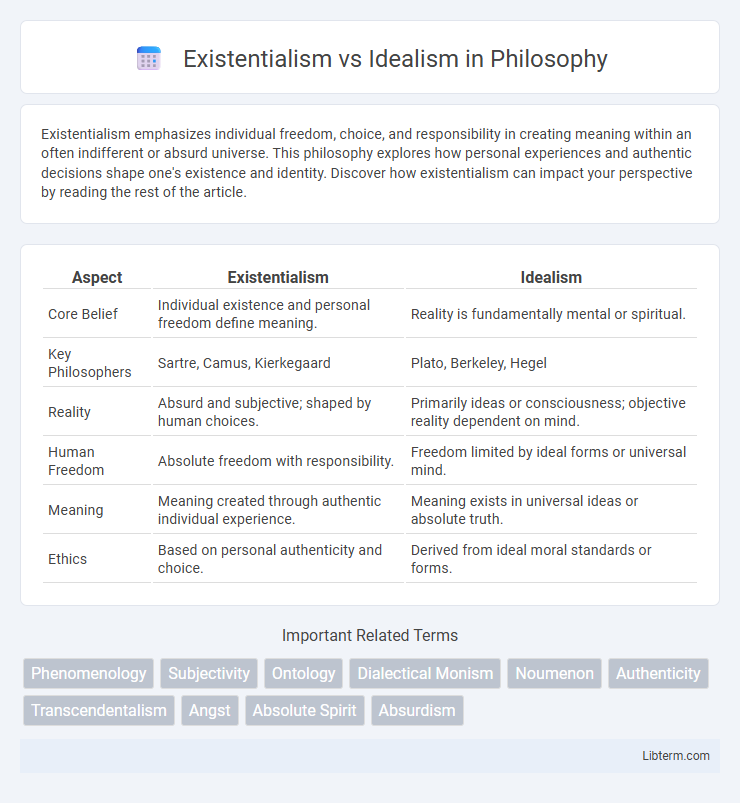Existentialism emphasizes individual freedom, choice, and responsibility in creating meaning within an often indifferent or absurd universe. This philosophy explores how personal experiences and authentic decisions shape one's existence and identity. Discover how existentialism can impact your perspective by reading the rest of the article.
Table of Comparison
| Aspect | Existentialism | Idealism |
|---|---|---|
| Core Belief | Individual existence and personal freedom define meaning. | Reality is fundamentally mental or spiritual. |
| Key Philosophers | Sartre, Camus, Kierkegaard | Plato, Berkeley, Hegel |
| Reality | Absurd and subjective; shaped by human choices. | Primarily ideas or consciousness; objective reality dependent on mind. |
| Human Freedom | Absolute freedom with responsibility. | Freedom limited by ideal forms or universal mind. |
| Meaning | Meaning created through authentic individual experience. | Meaning exists in universal ideas or absolute truth. |
| Ethics | Based on personal authenticity and choice. | Derived from ideal moral standards or forms. |
Defining Existentialism: Core Principles and Thinkers
Existentialism emphasizes individual freedom, personal responsibility, and the search for meaning in an indifferent or absurd universe, with key figures including Soren Kierkegaard, Jean-Paul Sartre, and Friedrich Nietzsche. This philosophy rejects predetermined essences, asserting that existence precedes essence, meaning individuals create their own values through authentic choices. Existentialism contrasts sharply with idealism, which posits that reality is fundamentally shaped by ideas or consciousness rather than material existence.
Understanding Idealism: Key Concepts and Origins
Idealism, rooted in the philosophy of Plato and further developed by thinkers like Kant and Hegel, posits that reality is fundamentally shaped by the mind and ideas rather than material objects. Central to idealism is the belief that consciousness and perception construct the essence of existence, emphasizing the primacy of mental phenomena over physical reality. This philosophical framework contrasts with existentialism by focusing on the universal and immutable nature of ideas, as opposed to subjective human experience and individual freedom.
Major Differences Between Existentialism and Idealism
Existentialism centers on individual freedom, choice, and subjective experience, emphasizing the creation of meaning in an inherently meaningless world, whereas Idealism posits that reality is fundamentally mentally constructed or shaped by consciousness. Existentialism rejects absolute systems and universal truths, focusing on personal authenticity and the lived experience of existence, while Idealism asserts that knowledge and reality are dependent on the mind or ideas. The major difference lies in Existentialism's focus on concrete human existence and freedom versus Idealism's emphasis on abstract, universal principles and the primacy of ideas over material reality.
Historical Evolution of Both Philosophies
Existentialism emerged in the 19th and 20th centuries with key figures like Soren Kierkegaard, Friedrich Nietzsche, Jean-Paul Sartre, and Martin Heidegger, challenging traditional metaphysics by emphasizing individual existence, freedom, and subjective experience. Idealism traces its roots to ancient philosophy but gained prominence through thinkers such as Plato, George Berkeley, and Immanuel Kant, advocating that reality is fundamentally shaped by mind or ideas rather than material substance. The historical evolution of both philosophies reflects a shift from universal, objective principles in idealism toward personal, subjective meaning in existentialism, highlighting differing approaches to understanding human consciousness and reality.
Existentialism and Idealism: Perspectives on Reality
Existentialism emphasizes individual experience, freedom, and personal responsibility as the foundations of reality, asserting that meaning is self-created rather than intrinsic. Idealism posits that reality is fundamentally mental or spiritual, with the material world dependent on consciousness or ideas. These contrasting perspectives highlight the debate between subjective human existence and the primacy of mind in shaping reality.
Freedom, Responsibility, and the Individual
Existentialism emphasizes individual freedom and personal responsibility, asserting that individuals must create their own meaning in an inherently meaningless world. Idealism, on the other hand, views reality as shaped by the mind or ideas, often prioritizing universal truths over individual autonomy. The tension between these philosophies highlights existentialism's focus on authentic selfhood versus idealism's emphasis on abstract, often collective ideals.
The Role of Subjectivity in Human Experience
Existentialism emphasizes subjectivity as the core of human experience, asserting that individuals create their own meaning through choices and personal responsibility in an inherently indifferent universe. Idealism, in contrast, posits that reality is fundamentally shaped by the mind or consciousness, where subjectivity reflects universal ideas or absolute truths. The existentialist view centers on individual existence and subjective freedom, while idealism highlights the primacy of collective or absolute consciousness in shaping human experience.
Meaning and Purpose: Contrasting Worldviews
Existentialism emphasizes individual meaning and purpose created through personal experience and choice, rejecting predefined essence or universal truths. Idealism posits that reality and meaning are fundamentally shaped by mind or consciousness, often linking purpose to absolute ideas or spiritual principles. These contrasting worldviews place the source of meaning either within subjective human existence or within objective ideal forms.
Influence on Literature, Art, and Culture
Existentialism's influence on literature is marked by explorations of individual freedom, anxiety, and absurdity, seen in works by authors like Jean-Paul Sartre and Albert Camus, who challenge traditional narratives and emphasize subjective experience. Idealism's impact on art and culture reflects a focus on the mind's primacy and the pursuit of absolute truths, inspiring Romanticism and transcendent themes in visual arts and literary works of philosophers like Hegel. Both philosophies shape modern intellectual discourse, with existentialism pushing for authenticity and self-realization, while idealism champions the power of ideas and consciousness in shaping reality.
Contemporary Relevance and Criticisms
Existentialism emphasizes individual freedom and subjective experience, resonating in contemporary debates on personal identity and mental health, while Idealism's focus on the primacy of ideas influences modern discussions in cognitive science and metaphysics. Existentialist critiques highlight its potential for nihilism and neglect of social structures, whereas Idealism faces criticism for its abstractness and detachment from empirical reality. Both philosophies continue to shape contemporary thought by challenging assumptions about reality, consciousness, and human purpose.
Existentialism Infographic

 libterm.com
libterm.com